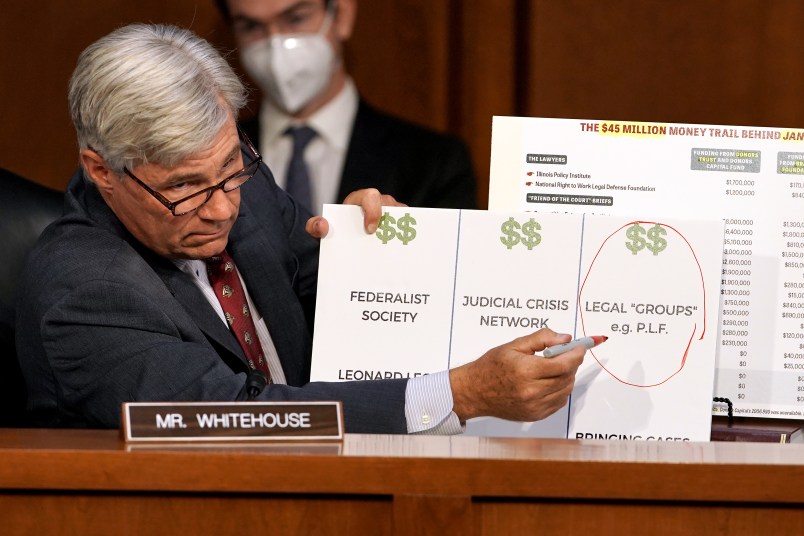Refusing to play along with Republicans’ rushed confirmation hearings, Senator Sheldon Whitehouse (D-RI) spent his half hour Tuesday largely ignoring Supreme Court nominee Amy Coney Barrett in favor of ripping down the curtain on the influences behind her nomination.
“I guess the reason I want to do this is because people who are watching this need to understand that this small hearing room and the little TV box you are looking at are a little bit like the frame of a puppet theater,” he opened. And if you only look at the puppet theater, he said, “you are certainly not going to understand forces outside of this room who are pulling strings and pushing sticks and causing the puppet theater to react.”
With that, he pulled out markers and a stack of visual aides. He spent the next 30 minutes showing how conservative groups including the Federalist Society and Judicial Crisis Network interact and influence behind the scenes, with a hand in every stage of the judicial nominee process from selection to confirmation to decisions on the bench. He shone a light on the deep ties between this system and the Republican Party, even calling out by name some of his fellow committee members who are a part of it.
He started by pointing out the enthusiasm of Republicans to support the new nominee, even before Barrett had been named, even when it meant for some making dramatically hypocritical pirouettes from the positions they took during the 2016 Merrick Garland fight.
He added that the “political ram job” was so important to the Republicans that they proceeded with hearings amid a pandemic even while the Senate is closed due to the positive COVID-19 tests of some members.
“My experience around politics is that when you find hypocrisy in the daylight, look for power in the shadows,” he said.
He ticked off three reasons why viewers should care about the strings being pulled: the Affordable Care Act, Obergefell v. Hodges and Roe v. Wade. Quickly dismissing Republican insistence that no one can possibly know how Barrett will rule on those issues, he pointed to ad campaigns, donations to groups and the party platform — all which show an enormous amount of money and interest in overturning those cases at the hands of a majority-conservative Court.
He then broke down the various streams of money and influence.
The first he identified as the Federalist Society, helmed by Leonard Leo, and the Judicial Crisis Network, led by Carrie Severino, that are funded, often anonymously, by donors with an interest and millions of dollars to spend on a group that will select and run PR for judicial nominees.
Then he switched to another lane: groups funded by dark money to bring cases before the Supreme Court.
“They do not wind their way to the Court, they get shoved to the Court by these legal groups, many of which ask to lose below so they can get quickly to the Court to get their business done there,” he said. “And then they turn up in an orchestrated chorus of amici.”
He said that those groups and flocks of briefs are funded by “identity scrubbers” like Donors Trust and the Bradley Foundation, which allow people to funnel millions to these efforts anonymously.
The money, he argued, is the connection.
“The Federalist Society, remember this group that is acting as a conduit and that Donald Trump has said is doing his judicial selection?” he asked. “They’re getting money from the same foundations.”
“This more and more looks like it’s not three schemes but it’s one scheme with the same funders selecting judges, funding campaigns for the judges and showing up in court in these orchestrated amicus flotilla was to tell the judges what to do,” he added, pointing to a poster board separated into columns of the Federalist Society, Judicial Crisis Network and the groups that file briefs.
As an example for the interlocking webs, he used the lawsuit currently at the Supreme Court that is challenging the Affordable Care Act — the well Democrats have been drawing from all hearing long.
He showed that Severino has signed anti-ACA briefs on behalf of Republican senators, who he called out by name, and that the Judicial Crisis Network has funded the Republican Attorneys General Association, members of which brought the ACA lawsuit currently before the high court.
He rounded out his presentation by highlighting the track record of wins in cases with such characteristic conservative donor interest: 80 to 0, with a bare five-to-four partisan majority.
“Something is not right around the court,” he intoned. “And dark money has a lot to do with it. Special interests have a lot to do with it.”
His presentation today, Whitehouse concluded, turning back to Barrett, lays out the basis “for you and I to tee up an interesting conversation tomorrow.”



